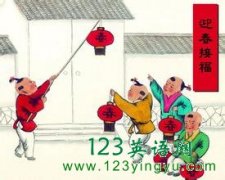初中英语语法大全:连词(4)
编辑:高中作文网C .He is ____ young ____ he ____ go to school .
D .He isn't ______ _______ ______ go to school (Keys :B :such , that , can't C :so ,that ,can't .D : old ,enough to )
易错分析:
①关于not…until
He stayed there until it was very late.
句中,stay是可延续性动词,所以不用not。
He didn't leave until it was very late.
句中,leave是不可延续性动词,所以用not
②because, so;although, but
上面已经提到,because和so及although和but不连用。
例如:
Because he was late, he didn't catch the first bus.
一定不可以说
Because he was late, so he didn't catch the first bus.
③or还是and
祈使句+or+陈述句前后是对立的
祈使句+and+陈述句前后是统一的
(or或and后的陈述句,常用一般将来时)
Study hard, or you won't pass the exam.
Study hard, and you will pass the exam.
两句都可以转换成“If条件句+主句”形式,注意:要去掉or和and:
If you don't study hard, you won't pass the exam.
If you study hard, you will pass the exam.
④because, since, as, for表示原因时的区别
尽管because, for, since, as都表示原因,但是用法上有不同.
because通常表示说话人认为这种理由或者原因是听话人所不知道的.
如:
He didn't attend the meeting because he had too much work to do.
since表示的原因是人们已知的事实,常译作“既然”。
如:
Since he can't answer this question, you'd better ask someone else.
as表示原因与since差别不大,只是语气更弱,多译为“由于”
如:
As I haven't seen the film, I can't tell you what I think of it.
for表示因果关系时,只能放在主句之后,不能放在句首。而且经常是对主句补充说明理由或推断原因。
如:
It rained last night, for the ground is wet.
⑤ as, when, while
这三个连词都可引导时间状语从句,但用法有所不同。
1) 当某事正在进行的时候,又发生了另一件事。While, when, as 都可用来引导表示“背景”的时间状语从句。例如:
As/When/While I was walking down the street I noticed a police car.
2) 当两个长动作同时进行的时候,最常用的是while。例如:
While mother was cooking lunch, I was doing my homework.
3) 当两个动作都表示发展变化的情况时,最常用的是as。例如:
As children get older, they become more and more interested in things around them.
4) 当两个短动作同时发生时,或表示“一边…一边…”时,最常用as。例如:
Just as he caught the fly, he gave a loud cry.
She looked behind from time to time as she went
5) 当从句的动作先于主句的动作时,通常用when。例如:
When he finished his work, he took a short rest.
6) 当从句是瞬间动作,主句是延续性动作时,通常用when。例如:
When John arrived I was cooking lunch.
(6)if, whether
if和whether都可作“是否”讲,在引导宾与从句是一般可互换。例如:
I wonder whether (if) you still study in that school.
I don’t know whether (if) he likes that film.
1) 引导主语从句时。例如:
Whether he will come to the party is unknown.
2) 引导表语从句时。例如:
The question is whether I can pass the exam.
3) 在不定式前。例如:
I haven’t made up my mind whether to go there or not.








